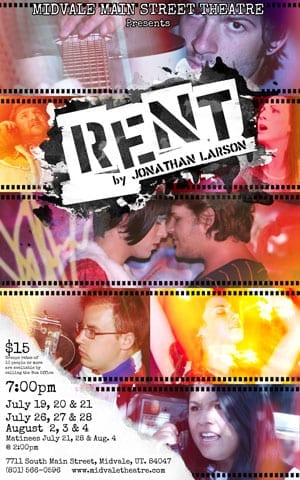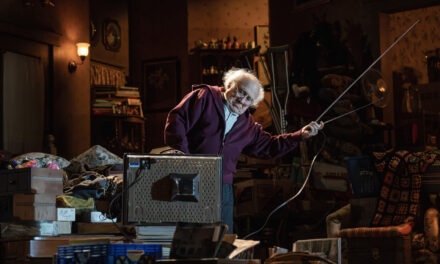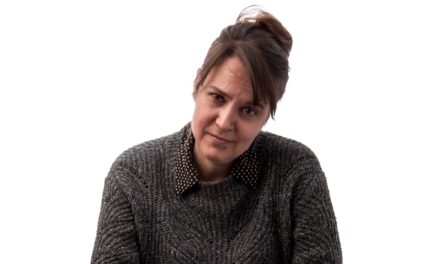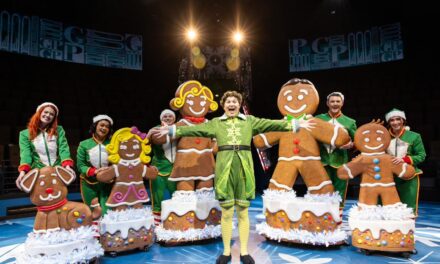MIDVALE — Making the short list of musicals ever awarded a Pulitzer Prize, Jonathan Larson’s Rent is designed to do so much more than entertain. Rent could be described as a show about the lives of struggling young artists, about a bohemian lifestyle prevalent in New York’s Lower East Side, or about HIV/AIDS. Those familiar with the music often feel a connection to individual moments of the score, finding meaning in phrases such as “Viva la vie boheme!” or “No day but today.” But in its entirety, Rent is so much bigger than a sum of its parts. Rent is a story about community, about being a part of something beyond oneself. Although its plot revolves around a specific cast of characters, its themes could be overlaid on any chapter of the human existence.
The Midvale Main Street Theatre stage features two levels for performers, extending the stage onto two side balconies and a second story platform at the rear. Exposed metal on the balconies and staircases fit in perfectly with set art designed by Ryan Fallis, and costumes designed by Jan Harris captured the essence of 1990’s grunge. Against this backdrop, director Tammy Ross’s director’s note resounded: “Being an artist is a rewarding, frustrating, and heart-breaking experience… The only way through it is to realize you are not alone.”
This attitude was reflected through the strong group numbers that facilitated powerful moments, including “No Day but Today” and “Seasons of Love.” “Santa Fe” showed off the cast’s vocal prowess and Eve Speer’s strong music direction. And while Michael Howell as documentary filmmaker Mark Cohen and Daniel Silva as musician Roger Davis delivered convincing emotions and puncturing melodies individually, neither was as strong alone as when they were singing together.
The chemistry between characters was poignant with deep emotions contrasted by moments of humor. Ashlee Brererton (Mimi) and Silva kept up a playful banter throughout the candle sequence, making their characters feel a little more human. Choreographer Aaron Ford designed several comical moments during “Tango: Maureen” that served as a believable basis for the unlikely friendship of Joanne (Carolyn Crow) and Mark, current and former lovers of the less-than-faithful Maureen (Shawnee K. Johnson).
Several great moments came in seemingly unlikely places, beginning with company freezes in the title song “Rent.” The live band’s introduction to Roger’s anthem “One Song Glory” was mesmerizing as the vibrations of a plucked guitar string reverberated through the room. Smart scene changes included a table used prominently throughout the show which stood on its end to become a door. And Thomas Fitzgerald’s portrayal of the Waiter in “La Vie Bohème” bridged the gap between the bohemian customers and the trying-to-be-classy Benjamin Coffin III (Sterling Young).
Frank Castro played Angel Dumott Schunard, a drag queen whose self-confidence and positivity becomes an emotional anchor for the struggling artists. Ford’s choreography in “Today 4 U” was dynamic, and Castro delivered impressive moves including a standing jump onto the table in heels. However, Castro appeared to be concentrated on the dance steps and failed to deliver the uninhibited performance I would have expected from Angel. But for any moment in which I doubted Castro’s sincerity, there were plenty to convince me otherwise. One of Castro’s strongest moments was when he appeared in “Life Support” as both sides of Angel’s character, showing his natural hair with her glittery makeup and Christmas dress. His voice in “I’ll Cover You” was smooth and effortless. And for a moment, every other detail of the show fell into the background as I watched Castro suffer the physical pain of Angel’s death.
While many leads had strong moments, including Crow in “We’re Ok” and “Take Me or Leave Me” and Aleksndr Arteaga (playing Tom Collins) in “I’ll Cover You Reprise,” none were as consistent as Silva. Though I’m familiar with the score, I’ve never felt Roger’s need to find “One Song Glory” as deeply as I felt it in this portrayal. Immediately buying into the character, I found myself framing the entire plot around Roger’s story. Not only was Silva’s voice strong (despite rumored laryngitis), but his body language often spoke stronger, supporting the lyrics consistently throughout his scenes.
Unfortunately, despite many successful moments in this production, there were elements which prevented it from gathering any momentum. The most disruptive element was the live band which was simply too loud for the small space. In order to balance the vocals with the very loud music, the microphones were turned up louder than would otherwise have been necessary, destroying the possibility of the intimacy created in a small theater. This over-amplification contributed both to difficult-to-understand lyrics and to my occasional desire to close my eyes just to reduce the amount of sensory input I was receiving.
Lighting, designed presumably by Ross but uncredited in the program, seemed sporadic with characters moving in and out of light at distracting times. In “La Vie Bohème,” characters would step out of the light as they stood on the tables during solo moments. In other instances, such as scenes between Roger and Mimi which frequently took place just right of center stage, it appeared that if they had taken one step further to the right, their faces would have been lit. That light often reflected off the edges of their scenes, distracting from rather than supporting the acting. An additional distracting technical element was the use of a handheld cordless microphone. While I understood Ross’s desire to amplify ensemble solos, the microphone pulled me from the illusion each time it was used outside of its microphone stand.
The dance sequences, while beautifully executed, occasionally got in the way of the performance. This seemed to be the case as Brererton struggled to catch her breath while dancing up and down the staircases during “Out Tonight.” The company seemed similarly affected during portions of “La Vie Bohème.” While the dancing seemed to take precedence in most numbers, the creative neon take on “Contact” would have benefited from stronger delivery in the dancing.
Many actors cast in ensemble roles, including the “Christmas is Coming” chorus and the parents of the young artists, lacked individual strength. Awkward melodies were made more awkward by actors and actresses who seemed a little unsure of how to fully commit to their roles. The ensemble soloist who began “Will I?” made great attempts at delivering character but sacrificed the melody of what is arguably the greatest musical moment of the show.
But just like the show itself, this cast is somehow greater than the sum of its parts, and that equation took place largely in the second act. Beginning with Roger and Mimi’s breakup, “Without You,” the show reached a new level where the minutia began to melt away, replaced by meaning. As the actors portrayed the story on stage, I found myself reflecting on the stories of a community that existed beyond the script.
Waiting for the show to start, I’d been given a bit of a history lesson by an avid Midvale Main Street Theatre supporter, Ross’s own husband. He’d shared with me the theater’s physical history as well as Ross’s decision to bring shows like Rent into the community theater arena. He shared with me the cast’s passion for community theatre, indicating that all of the set had been built, welded and painted by cast members and members of their families. He shared the story of a young actress who, shortly after completing the run of a previous Midvale Main Street Theatre production, died unexpectedly. Her name, he pointed out, was included in the set’s graffiti, “Link {heart} Kat.”
“There is a community that exists of people who have the same desires and needs,” Ross continued in her director’s notes. For a few hours, I was a part of that community. For a show like Rent, that is success. For those who have not had the opportunity to experience Rent in a live setting, this production is a great way to gain additional perspective on the idea of community. (Parents may wish to do additional research regarding the plot and themes before deciding to purchase tickets for audience members under 18.)






